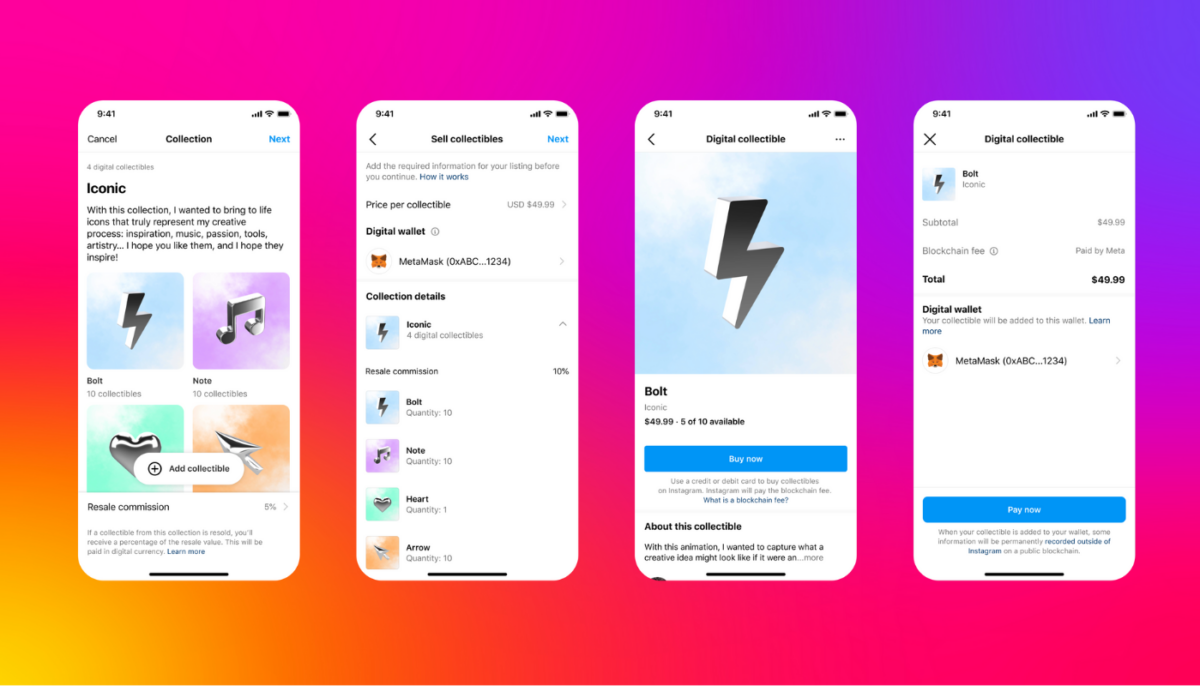Moments ago, Instagram announced that it would be ending its work on digital collectibles (NFTs). In a Twitter thread, Stephane Kasriel, Commerce and FinTech Lead at Meta, announced that features supporting NFTs would be disabled across the platform.
“We’re looking closely at what we prioritize to increase our focus. We’re winding down digital collectibles (NFTs) for now to focus on other ways to support creators, people, and businesses,” he wrote. Kasriel didn’t offer any reasoning or justification for the decision, but said that creating financial opportunities for creators “remains a top priority.”
The company didn’t release any information about precisely when the features would be disabled, and representatives from Meta didn’t immediately respond to nft now’s request for comment. Ultimately, the news came as a shock to many creators on the platform, especially as the company only rolled out the features in recent months.
Instagram’s NFT timeline
Instagram first started testing its NFT features with select creators in May of 2022. However, most users only got their first real taste of the platform’s NFT integrations in August of the same year, when the company enabled the features for users in 100 countries all over the world.
However, at the time, the features only allowed users to display NFTs they created or collected. The platforms’ core NFT functionalities had yet to be added — namely, the ability for users to mint, buy, and sell NFTs with one another.
It wasn’t until November of 2022 that things changed. Just ahead of the new year, Instagram allowed a handful of creators to start selling NFTs on the platform. The artists who were selected were hopeful, believing that the move would lead to a new and more equitable creator economy.
“The NFT community would be wise to understand how intertwined we are with social media, […] I think with our powers combined, we can create a more sustainable system for creatives who work in interconnected online communities,” Dave Krugman, one of the creators selected to test Instagram’s NFT marketplace features, told nft now at the time.
That was only four months ago.

The Web3 community responds
When the news broke today, Krugman was one of the first creators to respond. “Such a short-sighted move. [The] inclusion of digital collectibles has so much potential to help creators engage their communities and counterbalance the pitfalls of attention-based advertising economies. You guys quit before you even started. A real shame and undoing a lot of really smart work by great people there,” he wrote.
Meanwhile, Connie Ansaldi, CEO and Founder of Carnaval Art, a blockchain-powered loyalty service for companies, claimed that the company was lacking foresight and allowing their fear to guide them. “You’re not thinking in the long run. What if you would have said goodbye to the internet when the bubble exploded back in the 2000s? There would be no Google. Or Meta whatsoever,” she said.
Other well-known artists, such as Nyan Cat creator Chris Torres, mocked the company for its ill-conceived and poorly thought-out plan.
But despite the surprise and anger from creators, sudden moves like this aren’t entirely unprecedented at Meta — especially in recent months. Reality Labs, the division of Meta that works on AR and VR products, lost more than $13 billion in 2022 alone, and the company has been cutting costs in recent months. In November of 2022, the same month it rolled out its core NFT features, Meta laid off some 11,000 employees. The event was the largest cut in the company’s history.
And so it seems that Meta’s plans to take over the metaverse may not be off to a terribly great start.
This is a breaking story and was updated.


